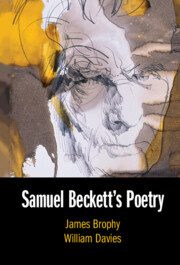Book contents
- Samuel Beckett’s Poetry
- Samuel Beckett’s Poetry
- Copyright page
- Contents
- Notes on Contributors
- Acknowledgements
- Abbreviations
- Introduction
- Chronology of Samuel Beckett’s Poetry
- Chapter 1 Weirdness and Dislocation in Beckett’s Early Poetry
- Chapter 2 Whole Fragments
- Chapter 3 Pre-echoing the Bones
- Chapter 4 ‘The Nucleus of a Living Poetic’
- Chapter 5 Beckett Growing Gnomic
- Chapter 6 Gender, Pronoun and Subject in ‘Poèmes 1937–1939’
- Chapter 7 The Missing Poème
- Chapter 8 Romanticism and Beckett’s Poetry
- 9 Romance under Strain in ‘Cascando’
- Chapter 10 Samuel Beckett’s Self-Translated Poems
- Chapter 11 Samuel Beckett’s Translations of Mexican Poetry
- Chapter 12 Beckett’s Poetry and the Radical Absence of the (War) Dead
- Chapter 13 Beckett’s Sound Sense
- Chapter 14 The Matter of Absence
- Chapter 15 ‘Mocked by a Tissue That May Not Serve’
- Chapter 16 Invoking Beckett
- Index
Chapter 4 - ‘The Nucleus of a Living Poetic’
Samuel Beckett and His Irish Contemporaries
Published online by Cambridge University Press: 15 December 2022
- Samuel Beckett’s Poetry
- Samuel Beckett’s Poetry
- Copyright page
- Contents
- Notes on Contributors
- Acknowledgements
- Abbreviations
- Introduction
- Chronology of Samuel Beckett’s Poetry
- Chapter 1 Weirdness and Dislocation in Beckett’s Early Poetry
- Chapter 2 Whole Fragments
- Chapter 3 Pre-echoing the Bones
- Chapter 4 ‘The Nucleus of a Living Poetic’
- Chapter 5 Beckett Growing Gnomic
- Chapter 6 Gender, Pronoun and Subject in ‘Poèmes 1937–1939’
- Chapter 7 The Missing Poème
- Chapter 8 Romanticism and Beckett’s Poetry
- 9 Romance under Strain in ‘Cascando’
- Chapter 10 Samuel Beckett’s Self-Translated Poems
- Chapter 11 Samuel Beckett’s Translations of Mexican Poetry
- Chapter 12 Beckett’s Poetry and the Radical Absence of the (War) Dead
- Chapter 13 Beckett’s Sound Sense
- Chapter 14 The Matter of Absence
- Chapter 15 ‘Mocked by a Tissue That May Not Serve’
- Chapter 16 Invoking Beckett
- Index
Summary
In August 1934, The Bookman published ‘Recent Irish Poetry’ under the nom de plume ‘Andrew Belis’; the two-page review by twenty-eight-year-old Samuel Beckett was drenched in local literary politics.1 Ironically, Beckett was at this time struggling to find his bearings as a man and as a writer; notwithstanding the authority with which he dispenses judgement, he was undergoing intense personal difficulties. Bearing in mind that he had been an athletic young man, an accomplished cricketer, golfer and rugby player, the physical ailments Beckett was experiencing were extensive: boils, cysts (which necessitated his being hospitalised twice), psoriasis, eczema, night sweats, tachycardia, back pain, insomnia, all culminating in a deeply upsetting moment recounted in James Knowlson’s biography of Beckett, Damned to Fame (1996):
I was walking down Dawson Street [in Dublin]. And I felt I couldn’t go on. It was a strange experience I can’t really describe. I found I couldn’t go on moving. So I went into the nearest pub and got a drink just to stay still. And I felt I needed help. So I went to Geoffrey Thompson’s surgery. Geoffrey wasn’t there; he was at Lower Baggot Street Hospital; so I waited for him.2
[Geoffrey] mentioned Sam very early to me. Sam was really ill in 1934 and Geoffrey was very worried about him. And in those days, there was little help for any kind of psychosomatic illness (panic attacks and so on).3
- Type
- Chapter
- Information
- Samuel Beckett's Poetry , pp. 70 - 84Publisher: Cambridge University PressPrint publication year: 2022



